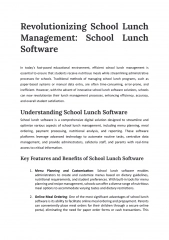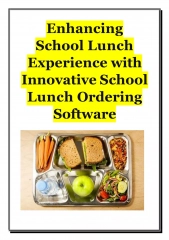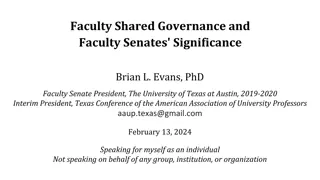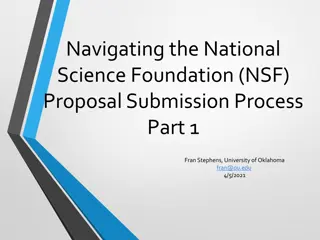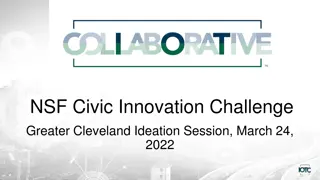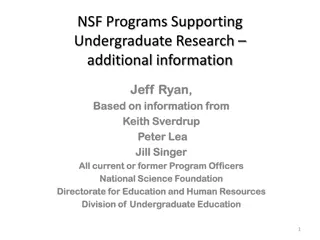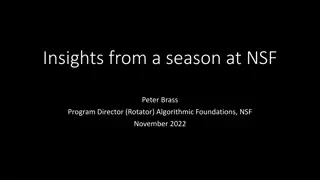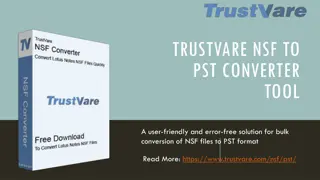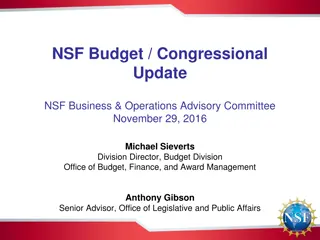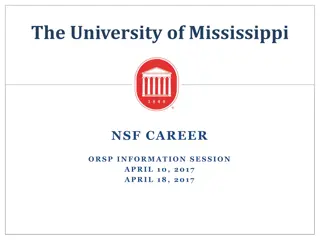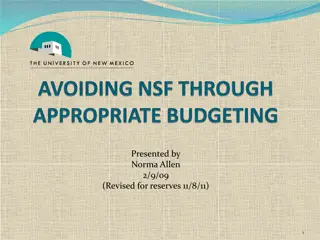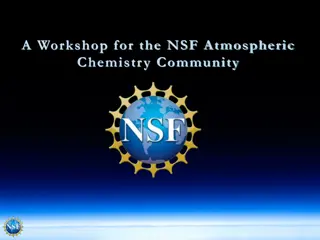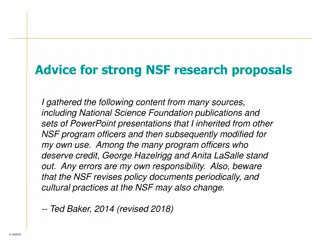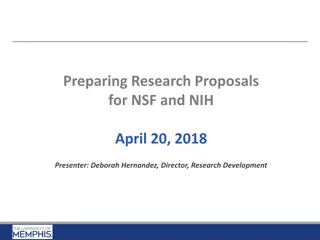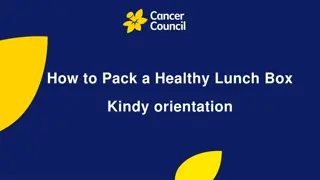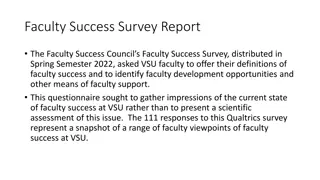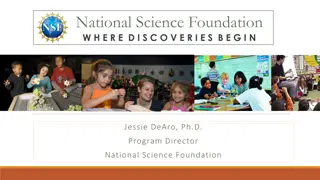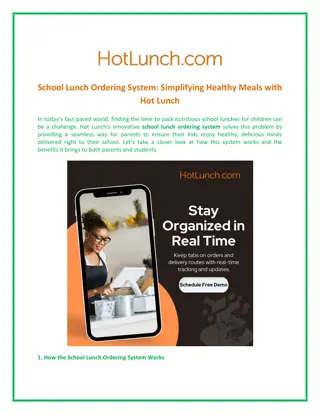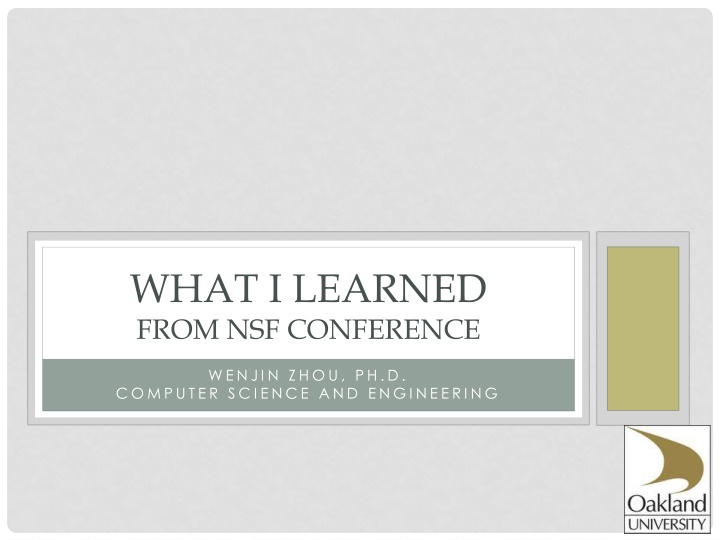
Insights from NSF Conference on Computer Science and Engineering
Explore key takeaways from Wenji N. Zhou, Ph.D., on computer science and engineering at the NSF conference. Gain valuable suggestions on engaging with program directors, enhancing proposal reviews, and navigating funding rates. Discover essential strategies for successful interactions and maximized opportunities in the academic field.
Download Presentation

Please find below an Image/Link to download the presentation.
The content on the website is provided AS IS for your information and personal use only. It may not be sold, licensed, or shared on other websites without obtaining consent from the author. If you encounter any issues during the download, it is possible that the publisher has removed the file from their server.
You are allowed to download the files provided on this website for personal or commercial use, subject to the condition that they are used lawfully. All files are the property of their respective owners.
The content on the website is provided AS IS for your information and personal use only. It may not be sold, licensed, or shared on other websites without obtaining consent from the author.
E N D
Presentation Transcript
WHAT I LEARNED FROM NSF CONFERENCE WENJI N ZHO U , PH.D. C O M PU TER SC I ENC E A ND ENGI NEERI NG
DISCLAIMER Merely my personal take-home message Everyone s opinion is different Discussions and questions
THREE SUGGESTIONS Talk to Program Director Talk to Program Director Talk to Program Director [Sayeef Salahuddin, NSF CAREER WORKSHOP 2013]
HOW TO TALK TO PD? Contact SOON Avoid busy spring panel season (April - June) Good time: Jan Feb How? Pitch your idea 1 page proposal abstract Mention to talk on the phone soon 2-3 slides if meeting in person Email one PD and CC all, DO NOT send separate emails
THE POWER OF PD Distribution by Average Reviewer Ratings for Awards and Declines, FY 2012 17838 Declines 10612 Awards 5095 3985 3355 2189 1,912 1,428 1211 905 80 1 No Score Poor Fair Good Very Good Excellent
NSF Competitive Awards, Declines & Funding Rates 60,000 100% 90% 42544 50,000 40366 80% 37089 30573 32752 32883 70% 33234 31732 40,000 31840 29,024 60% 30,000 50% 40% 32% 20,000 27% 30% 26% 25% 25% 24% 24% 23% 23% 22% 20% 10,000 14,642 13,014 11,534 11,352 11,185 11,024 10,721 10,317 10,254 9,757 10% 0 0% FY 2003 FY 2004 FY 2005 FY 2006 FY 2007 FY 2008 FY 2009 FY 2010 FY 2011 FY 2012 Awards Declines Funding Rate
PROPOSAL REVIEWERS DO suggest reviewers Help the program officers, ease their job Higher chances that your proposal is reviewed by proper experts DO exclude reviewers that have conflict of interest with you Names only No reasons needed
DISEASE Very sensitive to NSF, especially NSF BIO NSF do not fund any disease related research NIH does Focus on clarifying that the interest is not for the disease , but the fundamental understanding of biology
BUDGET Budget justification is VERY important Too high: 3-year proposal vs. 5-year Too low: PI don t know what they are actually getting into Ex. If you are proposing a massive project but asking for only 3 Ph.D. students, reviewers will think that you don t know what you are doing. Don t get points for low budget Aim for REALISTIC budget
COMPETE WITH R1 INSTITUTES What helps? Teaching release Does the PI have time to do this? Smaller institutes often lose the competition by over-commitment to teaching Waived overhead Graduate support Matching fund Important: Should NOT go into budget, violating cost sharing Put into facilities, equipment, and others Considered as volunteering uncommitted cost-sharing
LETTERS/SUPPLEMENTARY DOCUMENTS Reviewers are not required to read these DO NOT put any information related to merits Letter of support from Chair/Dean are not needed AND not preferred Story: PI gets asked the question by PD Except for NSF CAREER, chair letter required, not the dean
BECOME A REVIEWER! Introduce yourself and your research experience Express that you want to become a reviewer for their program Ask them when the next panel will be held Offer to send 2-page CV with current contact info Stay in touch if you don t hear right back.
NSF CAREER NSF encourage transformative proposals BUT, in reality, it is hard for a transformative proposal to get funded! Risk factor too high Most people don t believe it Most people will argue about it REALITY: NSF CAREER closer to be a career achievement award you need to build up a body of work before writing the CAREER [Sayeef Salahuddin, UC Berkeley, CAREER 2012]
NSF CAREER What s really different? Comprehensive education/outreach plan Go beyond what is expected from any Assistant Professor in your field Must NOT eat up all the research time Don t be na ve! Change something in high school education system? Big turn down, unless you have already done so Must have assessment plans Use data to show current involvements and results
NSF CAREER Keep trying! Sayeef Salahuddin, UC Berkely 2 submissions (2 years apart) Nate Foster, Cornell University 1 submissions (actual 3 trials. 1 last-min, 1 withdraw, 3 years apart) Ani Hsieh, Drexel University 3 submissions (4 years apart) Tommaso Melodia, SUNY Buffalo 3 submissions (4 years apart)
RESOURCES Award Search see what has been funded and who was the program officers Research.gov many useful information, outcome report PAPPG Proposal and award policies and procedures guide GPG NSF Grant Proposal Guide Program solicitations especially important b/c they include instructions to follow; collaborative funding opportunities Dear colleague letter Notifications of opportunities or special competitions for supplements to existing NSF awards
ASK EARLY, ASK OFTEN! GOOD LUCK!!!

